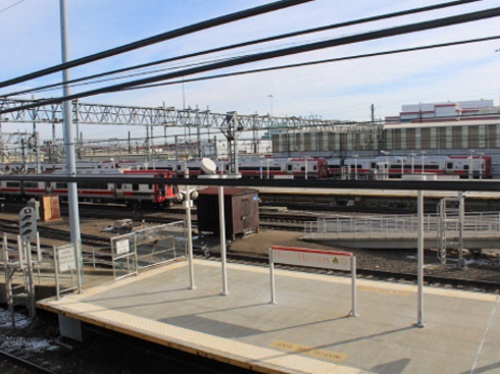The Connecticut Department of Transportation is making sustainability central to its new interim five-year Capital Plan, covering fiscal years 2022 through 2026.
[Above photo by the Connecticut DOT]
The agency said the interim plan includes $2.25 billion in total capital program funding for the fiscal year 2022, which began October 1, 2021, including approximately $1.36 billion for roadway and bridge infrastructure, $844 million for bus and rail, and $49 million in support of agency facility repairs and improvements.
Connecticut DOT added that its “new focus” within the new interim plan is on reducing greenhouse gas emissions, protecting natural and community resources, and improving the health and safety of residents – a focus that includes investments in public transportation plus bicycle and pedestrian infrastructure.
“Strategic investments in infrastructure, increased access to public transportation, and new initiatives that reduce our carbon emissions are critically important to economic growth in Connecticut and the health and safety of residents,” explained Joseph Giulietti, commissioner for the Connecticut DOT, in a statement.
“Our interim five-year plan demonstrates our ongoing commitment to safety, equity, and resiliency,” he said. “As we emerge from the pandemic, we will do so stronger and with the support we need.”
The Connecticut DOT also noted it operates more than 2,500 traffic signals – more than all other New England states combined – and is embarking on a 10-year program to upgrade the system to reduce transportation emissions and better meet the mobility needs of all roadway users.
Where public transportation is concerned, the agency said ridership continues to rebound from the COVID-19 pandemic, with rail ridership at approximately 50 percent and bus ridership over 70 percent of pre-COVID levels. Given new trends in commuter needs, such as more telework options, Connecticut DOT said focusing its transit funding on “service improvement and customer experience” projects.
Finally, the agency is aligning its funding with an executive order signed by Governor Ned Lamont (D) in December 2021 directing Connecticut DOT and all other state agencies to take “actionable steps” to reduce carbon emissions.
As a result, projects included in Connecticut DOT’s interim five-year plan that directly reduce emissions and improve air quality include installing more electric vehicle charging stations, installing solar power at agency facilities, plus expanding the Community Connectivity Grant Program to build-out accessible sidewalks, crosswalks, and bike infrastructure, while converting its transit fleet to electric buses.

